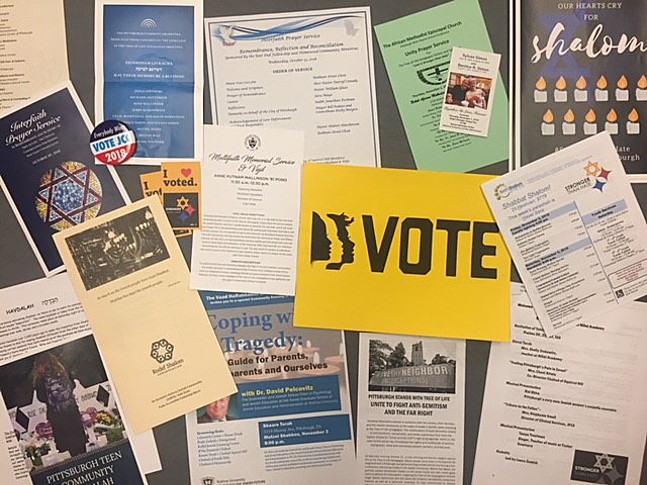The day of the Tree of Life shooting was marked by shock, mourning, and sadness. Then came the vigils and prayers, followed by protests and calls to action. Despite substantial documentation of the event, it’s easy for pieces of the story to get lost.
In order to not lose track of the community’s reactions to the attack, the Rauh Jewish History Program & Archives at the Heinz History Center started collecting materials related to the shooting, including digital and physical documents. The goal of the project is to capture the scope of reactions—both immediate and ongoing—and to create a long-term archive.
“We know how history works and we know that there's certain things that are hard to get in the record, and one of them is pain. It's really hard to get pain and grief in the historic record,” says Eric Lidji, director of the Program & Archives. While he expects to collect items for years to come, there is an urgency to capturing the raw and immediate reactions, which fade over time.
“You go to a memorial, and you feel it, but that feeling stays inside of your heart, and it doesn't always come out again,” says Lidji. “It's like trying to archive the ripples of a stone.”
Archiving is typically a long and slow process that doesn’t necessarily react to current events. It’s not always clear what will be in need of archiving, but when an event as instantly significant as Tree of Life happens, documentation is necessary.
Lidji began taking notes the day after the shooting and collected some material from the Sunday night vigil. On Monday, he received unsolicited but welcome consultation from an archivist in Orlando, Fla., who’d worked to archive the Pulse Nightclub shooting. The History Center modeled their digital collection website off of one created by the University of Virginia in the wake of the Charlottesville Unite the Right rally.
The History Center created a page on its website where people can submit photos, videos, social media posts, and personal stories. The project is also accepting physical pieces. Some of the items already received include sermons from local synagogues, Stronger Than Hate voting stickers, a jacket worn by a news anchor on the scene, and a statement posted by the Pittsburgh Chinese Restaurant Association. Right now the collections have mostly been local, but as the link gets shared, the perimeter will spread, as did reactions to the shooting.
“This is something we can do to preserve the dignity of all of us now, in making sure that the intensity of our feelings, the sincerity of our feelings, is not forgotten, in addition to the lives that were lost,” says Lidji.
Every mass shooting creates a similar sense of despondent grief, compounded by the fact that they are all entirely preventable if the government cared more about the right to safety than the right to weapons. After so many shootings, they all start to feel the same, but the pain of each is unique to its community. Newspapers will always have digital archives of their reporting, and Pittsburgh residents will never forget what happened, but by collecting memorabilia—factual and emotional—Lidji hopes the archive will both preserve and teach history.
“This project is the beginning of an initiative that could last a century, and it will be something that we won't even be around to see the end of, but we're trying to set something in motion that outlives us.”















